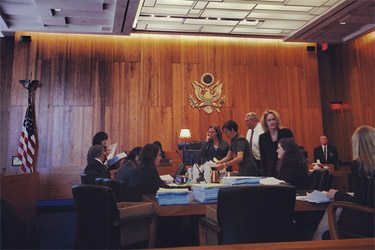Tears, Testy Exchanges on Second Day of Texas Abortion Law Trial
On the second day of Texas' omnibus anti-choice law trial, testimony focused on whether abortion providers would be able to obtain hospital admitting privileges under the new law.

On Tuesday, during abortion providers’ second day in court challenging Texas’ new omnibus anti-choice law, the CEO of a group of Texas abortion clinics testified that three of her six locations in the state would close next week if a federal judge does not block the parts of HB 2 that require abortion-providing doctors to secure admitting privileges at a hospital within 30 miles of where they perform their procedures.
While a coalition of abortion providers and reproductive and social justice groups are asking federal Judge Lee Yeakel to block two provisions of HB 2—one that requires the hospital admitting privileges, and another that mandates medication abortions be prescribed strictly according to 13-year-old Food and Drug Administration labeling—Tuesday’s hearing dealt predominantly with the admitting privileges provision.
“The physicians who are trained in Texas to provide abortion care, who could provide abortion care, are either fearful or unwilling or unable to make the commitment,” testified Amy Hagstrom Miller, CEO of Whole Woman’s Health, who described being regularly harassed by protesters and receiving bomb threats because of her business. As a result, she said that she has been so far unable to hire new doctors with hospital admitting privileges, and of her 11 current staff physicians only two have the local admitting privileges that would allow her to keep her Beaumont and Austin clinics open.
Another Whole Woman’s Health corporate representative, Andrea Ferrigno, testified that she has been trying since June to help her group’s doctors obtain admitting privileges at 32 different hospitals in Texas. Many, she testified, never responded to her request for applications at all. Not only do many hospitals have residency requirements for doctors with privileges—many abortion providers travel around the state to provide legal abortion care at a number of locations—but they also want doctors with privileges to generate business for their hospital, which many abortion providers could not do because of legal abortion’s very low complication rate.
Ferrigno was brought to tears on the stand when describing the impending closure of the Whole Woman’s Health clinic in McAllen, in Texas’ Rio Grande Valley, which she called her “home.”
“I’m very concerned in general, but the tears come because of McAllen,” testified Ferrigno. Because the only other Rio Grande Valley abortion clinic has announced it will close this month, said Ferrigno, if the Whole Woman’s Health in McAllen shuts its doors, Texans who seek abortions would need to drive hundreds of miles round-trip to get legal procedures in San Antonio or Corpus Christi. “I’m just really concerned about what women are going to do when they can’t access safe services.”
In cross-examination, an attorney for the state suggested that Hagstrom Miller could simply raise the price of all abortions across her clinics’ locations and therefore offer abortion providers more money to work for her.
“Have you considered raising your prices across the board?” Assistant Solicitor General Arthur D’Andrea asked Hagstrom Miller.
“I have considered that,” said Hagstrom Miller, who added that she didn’t feel it was “necessarily ethical” to put the cost burden entirely on patients, many of whom receive private financial aid to afford the $350 to $450 procedures.
D’Andrea pushed back against Hagstrom Miller, saying, “People still respond to incentives, right? If you’ve offered a full-time job and no one has taken you up on it, have you considered you might not be meeting market?”
Hagstrom Miller responded that shaky job security in light of Texas’ increasingly stringent abortion laws and fear for personal safety trumped any salary she might be able to offer, saying that one doctor she’d recruited ultimately decided to take a job in New York for less pay than what Hagstrom Miller could offer in McAllen.
“She took a job in New York City because it was less scary to her than McAllen,” testified Hagstrom Miller.
Before the court adjourned for the day, Judge Yeakel told attorneys that he would hear closing arguments Wednesday morning.
“What I want is focused argument on this statute and why it lives or dies under the law as it exists at this time,” said Yeakel, whose firm but jovial demeanor has lightened two days of proceedings on a tense political issue. He gave each side one hour to conclude their arguments.
“I never count off for not using all of your time,” said Yeakel, “and often, if you look back on my decisions, you can almost see an inverse correlation between how long you take in your argument and what you perceive the extent of justice to be.”
The court reconvenes at 10 a.m. Wednesday.
